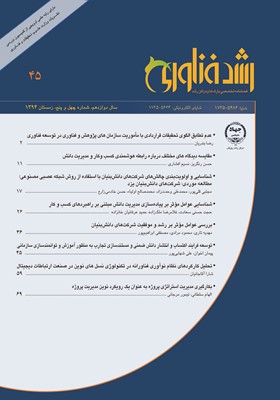شناسایی عوامل مؤثر بر پیادهسازی مدیریت دانش مبتنی بر راهبردهای کسب و کار
محورهای موضوعی : مديريت تکنولوژيحجت حسني سعادت 1 , حميد عرفانيان خانزاده 2 , غلامرضا ملک زاده 3
1 -
2 - علوم و تحقیقات تهران
3 - علوم اداری و اقتصادی
کلید واژه: عوامل مؤثر پیادهسازی دانش مدیریت دانش راهبردهای کسب و کار,
چکیده مقاله :
دانش منبعی ارزشمند و راهبردی و نیز یک دارایی مطرح است و ارایه محصولات و خدمات با کیفیت مناسب و اقتصادي، بدون مدیریت و استفاده صحیح از این منبع ارزشمند، امري سخت و بعضاً ناممکن است. امروزه مديريت دانش به يكي از فعاليتهاي مهم سازمانهای امروزی براي بهبود و حفظ مزيت رقابتي تبديل شده است كه هدف نهايي آن بهرهبرداري و توسعه داراييهاي دانشي در راستاي تحقق اهداف و ايجاد ارزش افزوده براي سازمان است. توجه به مدیریت دانش در تدوین راهبردهای کسب و کار جهت کسب مزیت رقابتی امری حیاتی میباشد. به همین جهت شناسایی عوامل مؤثر بر پیادهسازی مدیریت دانش مبتنی بر راهبردهای کسب و کار در این تحقیق مورد توجه قرار گرفت. در این راستا 55 عامل مؤثر بر پیادهسازی مدیریت دانش استخراج شد و با استفاده از روش دلفی و اخذ نظرات خبرگان، ارتباط آنها با راهبردهای کسب و کار احصاء گردید که بر این اساس 35 عامل مؤثر در 6 بعد رهبری، راهبردی، زیرساخت، ساختار، فرهنگی و علمی مورد تأیید خبرگان قرار گرفت. در میان ابعاد شناسایی شده، بعد رهبری بیشترین اهمیت را نسبت به دیگر عوامل دارد. پس از آن ابعاد راهبرد و علمی نقش داشتهاند. در مجموع نیز 64 درصد عاملهای شناسایی شده تأیید گردید.
Knowledge is a valuable resource and strategic factor and also an asset. So providing good and qualified products and services without management and use of this valuable resource, is difficult and sometimes impossible. Knowledge management has become one of the most important activities in today's organizations to improve and maintain competitive advantage. The ultimate goal of knowledge management is the operation and development of knowledge assets to achieve the goals and create added value for the organization. It is obvious that knowledge management is crucial in the formulation of business strategy for gaining competitive advantage. Therefore identifying factors affecting the implementation of knowledge management based on business strategy is very important. In this study, 55 factors affecting the implementation of knowledge management extracted. Then by using Delphi method and the adoption of experts opinion, their relationships with business strategies were identified. On this basis, 35 factors in 6 dimensions were identified: Leadership, Strategic, Infrastructure, Structure, Cultural and Scientific Dimension. Among the identified dimensions, leadership dimension was more important than the other dimensions. Strategic and Scientific dimensions are the next one and 64 percent of the identified factors were confirmed.
